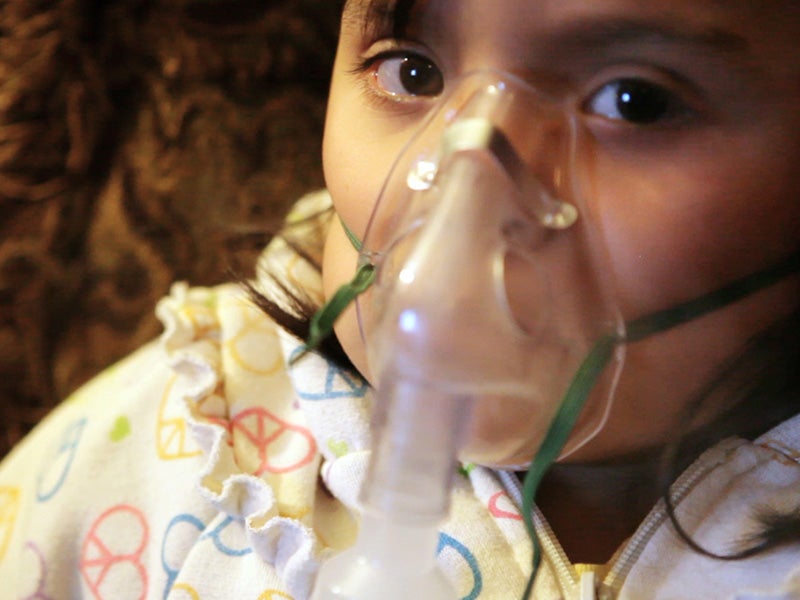California Cities In Fracas Over Huge Gas-Fired Power Plant
Citizens of Lancaster, CA, fear air pollutants from the plant will harm children's health.

This page was published 11 years ago. Find the latest on Earthjustice’s work.
A proposal for a large—570-megawatt—gas-fired power plant is pitting two Southern California cities against each other, and has aroused citizens worried about air quality and their children’s health. Members of Desert Citizens Against Pollution are suing to challenge the plant’s approval.
The plant would be sited in Palmdale on the border of Lancaster.
Lancaster has generally opposed this project because of health concerns related to significant emissions that would go into its neighborhoods. The city also questions the need for this power plant, which it claims could thwart efforts to promote renewable energy like solar and wind developments. On the flip side, Palmdale has been really supportive of this project.
Earthjustice is representing Desert Citizens Against Pollution, a group of Antelope Valley residents, in a lawsuit against the Antelope Valley Air Quality Management District over its decision to approve the power plant.
The group was formed in 1986 to address a widespread problem in the communities closest to a new cement plant and toxic incinerator. Families there were experiencing health problems such as headaches, respiratory problems, a metallic taste in their mouths, and other symptoms. In the time since, their air continues to be unhealthy due to a variety of other new pollution sources that are concentrated in this overburdened area—landfills, tire burning in cement kilns, nuclear waste transport and dumps and hazardous waste dumps.
In the case of this power plant, Desert Citizens Against Air Pollution are concerned about additional pollution adding to already problematic ozone levels in the neighborhoods. Ozone pollution is a powerful irritant that leaves the lungs inflamed as though they were sunburned. It causes premature death, asthma attacks and other breathing problems. It can send people to emergency rooms and hospitals. These health impacts are disproportionately felt by the most vulnerable—children, the elderly, and persons already suffering from respiratory ailments.
According to federal and California laws, in order to put a new power plant in an already polluted area, you have to show that pollution in the area has been reduced enough to justify the additional new pollution. The law allows you to transfer pollution reduction “credits,” but only in ways that don’t worsen the overall air quality of the area. These transfers and offsets ensure that air quality does not get worse as new pollution is added to a region, and California requires that several conditions are met in the transfers.
In its decision to permit this new gas plant, the Antelope Valley Air Quality Management District illegally transferred air pollution credits into the faraway heavily polluted Antelope Valley, worsening the situation for community members there, in order to build a large hybrid natural gas power plant. This week, Earthjustice, on behalf of Desert Citizens Against Pollution, filed a lawsuit against the AQMD over this transfer and approval process.
Specifically, our lawsuit challenges the transfer of credits of Nitrogen Oxides and Volatile Organic Compounds into the Antelope Valley AQMD to facilitate building the Palmdale Hybrid Power Plant. Our lawsuit claims the Antelope Valley AQMD failed to comply with California’s Clean Air Act in approving credits that would allow this project to be built.
The decision of the agency came amid great controversy. Jane Williams, Executive Director of Desert Citizens Against Pollution, spoke at the public meeting where the agency decided whether to allow this additional pollution into the region. Williams stated:
It is shameful that these agencies did not do the requisite analysis to protect the health of our residents, and instead give the burden to the courts and the affected residents. Nothing is more precious than our children, and our elders deserve every protection our society has to offer.
The court system now will be the arbiter of whether this transfer of pollution in the region was lawful.
The California Regional Office fights for the rights of all to a healthy environment regardless of where in the state they live; we fight to protect the magnificent natural spaces and wildlife found in California; and we fight to transition California to a zero-emissions future where cars, trucks, buildings, and power plants run on clean energy, not fossil fuels.